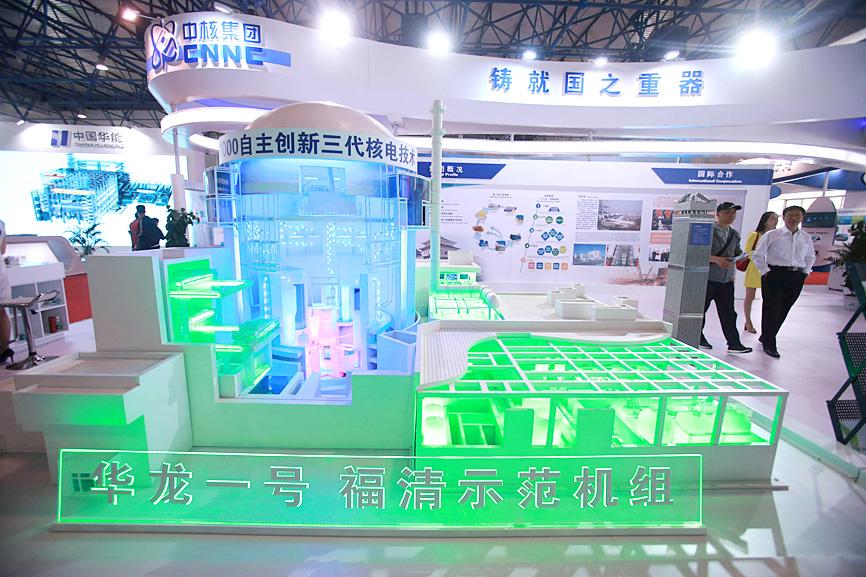China has powered up its first domestically developed nuclear reactor — the Hualong One — a significant step in Beijing’s attempts to become less dependent on Western allies for energy security and critical technology.
The reactor, which was on Friday connected to the national grid, can generate 10 billion kilowatt-hours of electricity per year and cut carbon emissions by 8.16 million tonnes, the China National Nuclear Corp (CNNC, 中國核工企業集團) said.
“This marks China breaking the monopoly of foreign nuclear power technology and officially entering the technology’s first batch of advanced countries,” CNNC said in a statement.

Photo: Reuters
Nuclear plants supplied less than 5 percent of China’s annual electricity needs last year, the Chinese National Energy Administration said, but this share is expected to grow as Beijing attempts to become carbon neutral by 2060.
Reducing its dependence on Western allies in critical high-tech sectors such as power generation is a key goal in Beijing’s “Made in China 2025” plan.
Billions of dollars in state subsidies have been given to Chinese companies to speed the process — a move that has angered China’s trade partners and sparked a protracted trade row with Washington.
Work on the Hualong One reactor started in 2015 and there are six other reactors under construction at home and abroad, state-owned plant operator CNNC said.
Hualong One, deployed at a plant in Fuqing in China’s Fujian Province about 200km from Taipei, would be put into commercial use by the end of the year after undergoing tests.
China has 47 nuclear plants with a total generation capacity of 48.75 million kilowatts — the world’s third highest after the US and France.
Beijing has invested billions of dollars to develop its nuclear energy sector in the past few years as it struggles to wean its economy from coal.
Thirteen nuclear plants are under construction, more than in any other country, despite environmental and safety concerns.
In August 2016, officials were forced to shelve plans for a nuclear waste facility in Lianyungang, a city in Jiangsu Province, after a rare public protest by thousands of residents.
Additional reporting by staff writer

A Chinese aircraft carrier group entered Japan’s economic waters over the weekend, before exiting to conduct drills involving fighter jets, the Japanese Ministry of Defense said yesterday. The Liaoning aircraft carrier, two missile destroyers and one fast combat supply ship sailed about 300km southwest of Japan’s easternmost island of Minamitori on Saturday, a ministry statement said. It was the first time a Chinese aircraft carrier had entered that part of Japan’s exclusive economic zone (EEZ), a ministry spokesman said. “We think the Chinese military is trying to improve its operational capability and ability to conduct operations in distant areas,” the spokesman said. China’s growing

Taiwan yesterday denied Chinese allegations that its military was behind a cyberattack on a technology company in Guangzhou, after city authorities issued warrants for 20 suspects. The Guangzhou Municipal Public Security Bureau earlier yesterday issued warrants for 20 people it identified as members of the Information, Communications and Electronic Force Command (ICEFCOM). The bureau alleged they were behind a May 20 cyberattack targeting the backend system of a self-service facility at the company. “ICEFCOM, under Taiwan’s ruling Democratic Progressive Party, directed the illegal attack,” the warrant says. The bureau placed a bounty of 10,000 yuan (US$1,392) on each of the 20 people named in

Nine retired generals from Taiwan, Japan and the US have been invited to participate in a tabletop exercise hosted by the Taipei School of Economics and Political Science Foundation tomorrow and Wednesday that simulates a potential Chinese invasion of Taiwan in 2030, the foundation said yesterday. The five retired Taiwanese generals would include retired admiral Lee Hsi-min (李喜明), joined by retired US Navy admiral Michael Mullen and former chief of staff of the Japan Self-Defense Forces general Shigeru Iwasaki, it said. The simulation aims to offer strategic insights into regional security and peace in the Taiwan Strait, it added. Foundation chair Huang Huang-hsiung

PUBLIC WARNING: The two students had been tricked into going to Hong Kong for a ‘high-paying’ job, which sent them to a scam center in Cambodia Police warned the public not to trust job advertisements touting high pay abroad following the return of two college students over the weekend who had been trafficked and forced to work at a cyberscam center in Cambodia. The two victims, surnamed Lee (李), 18, and Lin (林), 19, were interviewed by police after landing in Taiwan on Saturday. Taichung’s Chingshui Police Precinct said in a statement yesterday that the two students are good friends, and Lin had suspended her studies after seeing the ad promising good pay to work in Hong Kong. Lee’s grandfather on Thursday reported to police that Lee had sent